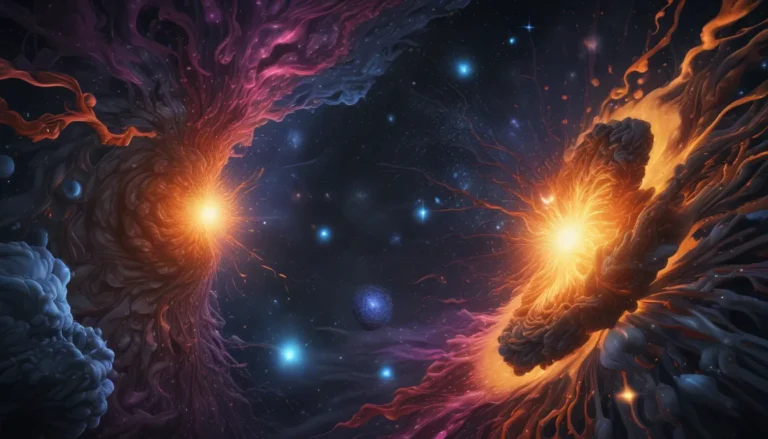The pictures we use in our articles might not show exactly what the words say. We choose these pictures to make you interested in reading more. The pictures work together with the words but don’t take their place. The words still tell you the important facts.
The Big Bang theory stands as one of the most intriguing and widely accepted scientific explanations for the origin of our vast universe. It proposes that approximately 13.8 billion years ago, the cosmos emerged from a singularity, a point of infinite density and temperature, initiating a sequence of events that led to the formation of galaxies, stars, and planets. In this article, we will embark on a journey through the remarkable facts about the Big Bang, shedding light on the cosmic processes that have shaped our existence. From the mysterious cosmic microwave background radiation to the concepts of dark matter and energy, these revelations continue to captivate scientists and deepen our comprehension of the universe. So, fasten your seatbelts and prepare to be astounded by these 13 groundbreaking facts about the Big Bang.
Understanding the Big Bang Theory
- The Big Bang theory is the prevailing explanation for the origin of the universe, suggesting that it began about 13.8 billion years ago from a dense singularity, not an explosion in space.
- The early moments following the Big Bang were marked by incredibly high temperatures and densities, with elementary particles like protons and electrons forming a scorching-hot plasma.
- The shape of the universe remains a topic of discussion among scientists, with various hypotheses about whether it is flat, open, or closed.
Unveiling Cosmic Mysteries
One of the key pieces of evidence supporting the Big Bang theory is the cosmic microwave background radiation, a faint radiation present throughout the universe, indicative of its early stages. This radiation's uniform distribution and precise temperature measurements bolster the credibility of the Big Bang theory. Additionally, the theory predicts the existence of cosmic inflation, a brief period of rapid expansion that occurred immediately after the Big Bang, leading to the uniformity observed in the cosmic microwave background radiation and the large-scale structure of the universe.
The Influence of the Big Bang
- The fusion of hydrogen and helium in the early universe gave rise to the basic elements that form stars, galaxies, and planets, including the atoms comprising our bodies.
- Observations of distant supernovae have revealed that the universe's expansion is accelerating, a phenomenon attributed to dark energy pushing galaxies apart.
Embracing Scientific Advancements
The Big Bang theory has served as a catalyst for numerous scientific breakthroughs in cosmology and astrophysics. It has inspired the discovery of dark matter and energy, fueled by rigorous testing and refinement using astronomical observations and theoretical models. This continuous exploration of the Big Bang theory not only enriches our understanding of the early universe but also pushes the boundaries of scientific knowledge.
Bridging Science and Faith
It is essential to note that the Big Bang theory is not inherently conflicting with religious beliefs. Many religious groups have integrated this theory into their understanding of the creation of the universe, viewing it as a complementary explanation that aligns with their faith. The harmony between science and religion in this context underscores the multifaceted nature of human inquiry and the diverse perspectives through which we seek to comprehend the cosmos.
The Profound Nature of the Big Bang Theory
As we reflect on the awe-inspiring origins of our universe, the Big Bang theory stands as a testament to the monumental forces that have shaped existence as we know it. It continues to provoke profound questions about our place in the cosmos and the fundamental nature of reality. From the intricate dance of particles in the early universe to the vast expanse of galaxies stretching across the cosmos, the Big Bang theory encapsulates the boundless curiosity and relentless pursuit of knowledge that define human exploration.
Conclusion
In conclusion, the Big Bang theory represents a cornerstone in our exploration of the universe's origins, offering a compelling narrative of the immense energy and expansion that characterized the early moments of our cosmos. Through meticulous observation, theoretical analysis, and technological innovation, scientists have pieced together a captivating saga of the universe's birth. The enduring relevance and vast implications of the Big Bang theory underscore its significance as a guiding light in our quest to unravel the mysteries of the cosmos.
FAQs
Q: What is the Big Bang theory?
A: The Big Bang theory is a scientific explanation for the birth and evolution of the universe, suggesting that it originated from an extremely dense and hot state approximately 13.8 billion years ago.
Q: How was the Big Bang theory developed?
A: The Big Bang theory was formulated through a combination of theoretical frameworks and observational evidence, with key contributions from scientists like Georges Lemaître and Edwin Hubble.
Q: What evidence supports the Big Bang theory?
A: Evidence such as cosmic microwave background radiation, light element abundances, and galaxy redshifts align with the predictions of the Big Bang theory, bolstering its validity.
Q: What happened after the Big Bang?
A: Following the Big Bang, the universe expanded and cooled, leading to the formation of galaxies, stars, and eventually planets as matter coalesced under gravity.
Q: Is the Big Bang theory universally accepted?
A: Yes, the Big Bang theory is widely accepted among scientists as the prevailing explanation for the universe's origin, with ongoing refinement and advancement based on new discoveries.
Journeying through the vast expanse of the cosmos, the Big Bang theory beckons us to explore the fundamental mysteries of our universe. As we marvel at the intricacies of cosmic evolution and the grandeur of celestial phenomena, the Big Bang stands as a testament to humanity's unyielding quest for knowledge and understanding. Let us continue to gaze up at the night sky, pondering the enigmatic forces that have shaped our existence, guided by the enduring light of scientific inquiry and discovery.






